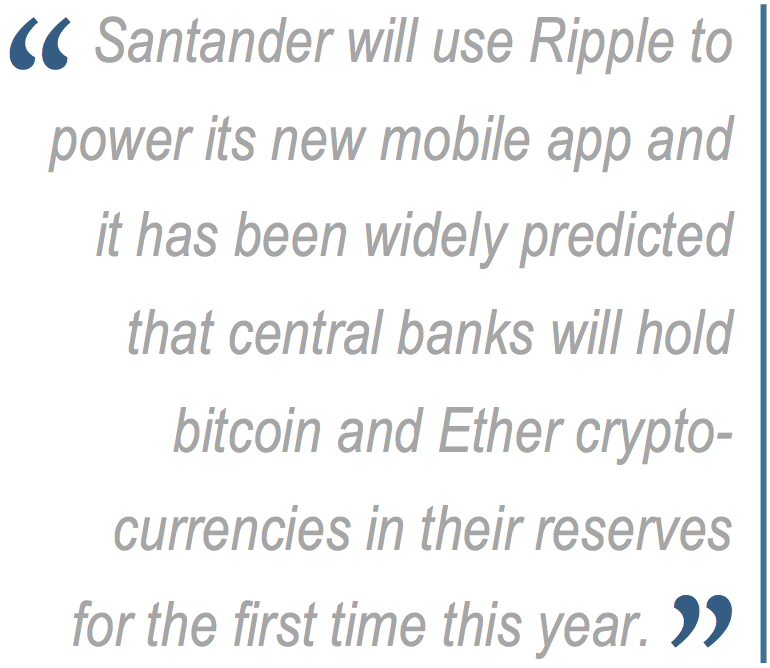


Major banks have already begun to invest in promising blockchain projects, and distributed ledger technology now seems poised to disrupt retail banking in an unprecedented way.
 photo istock
photo istock
by Aziz Bin Zainuddin, founder and chief crypto officer, Master The Crypto
Some have dismissed blockchain and cryptocurrency as a fad that spells too much trouble for governments to become a mainstay in our everyday lives. Others believe it presents too many advantages for businesses and consumers for it to disappear.
Either way, the technology is too revolutionary for banks to ignore.
Here is a roundup of how blockchain works and how banks might utilize it in the future.
Bitcoin is a borderless decentralized digital currency that was invented in 2008. Its founder, known only by the pseudonym Satoshi Nakamoto, cultivated it partly in response to the global financial crisis that unfolded in the same year.
One of Nakamoto's primary goals was to create a currency with a value that couldn't be affected by quantitative easing. To this end, he created an automated mining system that ensures there will only ever be 21 million bitcoins in existence. This means that the value of bitcoin will always be based on supply and demand.
 Bitcoin's borderless nature meant that overseas transactions would be subject to much lower fees than those charged by banks.
Bitcoin's borderless nature meant that overseas transactions would be subject to much lower fees than those charged by banks.
Bitcoin transactions are stored in an immutable decentralized ledger called the blockchain. Instead of existing on a single server, it exists on every computer that can connect to the internet.
The decentralized nature of blockchain makes it more secure and reliable than traditional banking databases, as there is no single database that could to be compromised by hackers or suffer from system failure.
Blockchain transactions are pseudonymous and there is no central authority that can ban anyone from making bitcoin transactions.
The advantages of bitcoin over fiat currency have driven its remarkable growth in value since its creation.
Blockchain technology was invented simply as a ledger for bitcoin transactions. Eventually, though, it became clear that its decentralized, immutable, pseudonymous nature could be put to use in innumerable other industries.
The invention of Ethereum in 2015 was a historic moment for blockchain technology. This open-source platform allows developers to create any type of software on blockchain without limits.
Revolutionary blockchain technologies such as smart contracts and decentralized autonomous organizations seem to be poised to disrupt the banking industry in a major way.
It is likely to be difficult for retail banks to ignore technology that is undeniably more secure and reliable than their current databases.
Firstly, its pseudonymous nature could help end identity fraud. Secondly, the decentralized nature of blockchain could help introduce faster payments than two centralized systems could ever manage.
While some blockchains (most notably bitcoin's) are notoriously slow, others that are lightning fast. Ripple, the second most-valuable cryptocurrency by market capitalization, can handle 1,500 transactions per second.
The use of smart contracts could improve the efficiency of banking transactions further still. Banks rely on contracts for all of their products, from credit cards to mortgages to checking and savings accounts.
Smart contracts can be applied to all of the processes detailed in these documents and, it is believed, massively reduce processing costs for banks. Indeed, smart contracts are expected to replace to replace the clunky and inefficient Know Your Customer identity management process soon rather than later.
 Wasting no time
Wasting no timeSeveral start-ups have received venture capital to develop the projects discussed above, but the majority of them are still just ideas at this stage.
However, several major banks have already moved to invest in and develop blockchain technology. A group of financial institutions led by Swiss bank UBS has agreed to use Ethereum to improve the quality of their reference data. Instead of entrusting it to a third party to review, they are happy to rely solely on blockchain.
Meanwhile, Santander will use Ripple to power its new mobile app and it has been widely predicted that central banks will hold bitcoin and Ether cryptocurrencies in their reserves for the first time this year.
Perhaps unsurprisingly, many central governments are doing their best to limit the growth of cryptocurrency on their shores.
This might be enough to halt the growth of bitcoin as the world's first truly global currency. It must overcome other hurdles as well, not least slow transaction times and wild fluctuations in value.
Whatever happens with bitcoin, though, it's difficult to dispute the advantages that blockchain is likely to bring to retail banking.
Aziz Bin Zainuddin is a blockchain expert and the founder and chief crypto officer of Master The Crypto (MasterTheCrypto.com), a knowledge hub and resource center for cryptocurrency investing and all things blockchain. In addition, Aziz runs C.M. Fund, a Singapore-based crypto hedge fund based that invests in cryptos with solid fundamentals and game-changing technology.
Sign up now for the ATM Marketplace newsletter and get the top stories delivered straight to your inbox.
Privacy PolicySeptember 9-11, 2024 | Charlotte, NC